CMS Developer Average Salary in Turkey 2024
How much money does a person working as CMS Developer make in Turkey?

LOW
3,140
TRY AVERAGE
6,410
TRY HIGH
10,000
TRY
A person working as CMS Developer in Turkey typically earns around 6,410 TRY. Salaries range from 3,140 TRY (lowest) to 10,000 TRY (highest).
Salary Variance
This is the average salary including housing, transport, and other benefits. CMS Developer salaries in Turkey vary drastically based on experience, skills, gender, or location. Below you will find a detailed breakdown based on many different criteria.
CMS Developer Pay Scale and Salaries in Turkey

Salary Structure and Pay Scale Comparison
5,940 TRY or more
5,250 to 5,940 TRY
3,730 TRY or less
3,730 to 5,250 TRY
 3,140 TRY |
 5,980 TRY |
 10,000 TRY |
Median Salary, maximum and minimum salary, minimum wage, starting salary, and the salary range
Salary Range, Minimum Wage, and Starting Salary
Salaries for the position CMS Developer in Turkey range from 3,140 TRY (starting salary) to 10,000 TRY (maximum salary). It should be noted that the given figure is not the legally mandated minimum wage; rather, it represents the lowest figure reported in a salary survey that included thousands of participants and professionals from all regions of the country.
Median Salary
With a median salary of 5,980 TRY, half of the professionals who work as CMS Developer in Turkey earn less than this amount, and the other half earn more. The median salary denotes the middle value of salaries. Ideally, you would want to belong to the group earning more than the median salary, located on the right side of the salary distribution graph.
Percentiles and Salary Scale
The median is closely associated with two other values known as the 25th and 75th percentiles. By examining the salary distribution chart, it can be determined that 25% of professionals employed as CMS Developer in Turkey earn less than 4,890 TRY, while 75% earn more. Similarly, the chart shows that 75% earn less than 6,840 TRY while 25% earn more.
Pay Scale Structure
To provide a better understanding of expected salaries, we categorized the frequently occurring salaries into different ranges. This approach provides a more precise representation of salary distribution for the job title CMS Developer in Turkey compared to simply calculating the average. The majority of reported salaries, approximately 65%, fall within the range of 3,730 TRY to 5,250 TRY. About 20% of salaries are below the 3,730 TRY mark, while 10% fall within the range of 5,250 TRY to 5,940 TRY. Only 5% of individuals have salaries exceeding 5,940 TRY.
Salary Comparison by Years of Experience / CMS Developer / Turkey
How do experience and age affect pay?
| 0 - 2 Years | 3,720 TRY | |
| 2 - 5 Years | +29% | 4,790 TRY |
| 5 - 10 Years | +38% | 6,600 TRY |
| 10 - 15 Years | +24% | 8,180 TRY |
| 15 - 20 Years | +7% | 8,770 TRY |
| 20+ Years | +7% | 9,350 TRY |
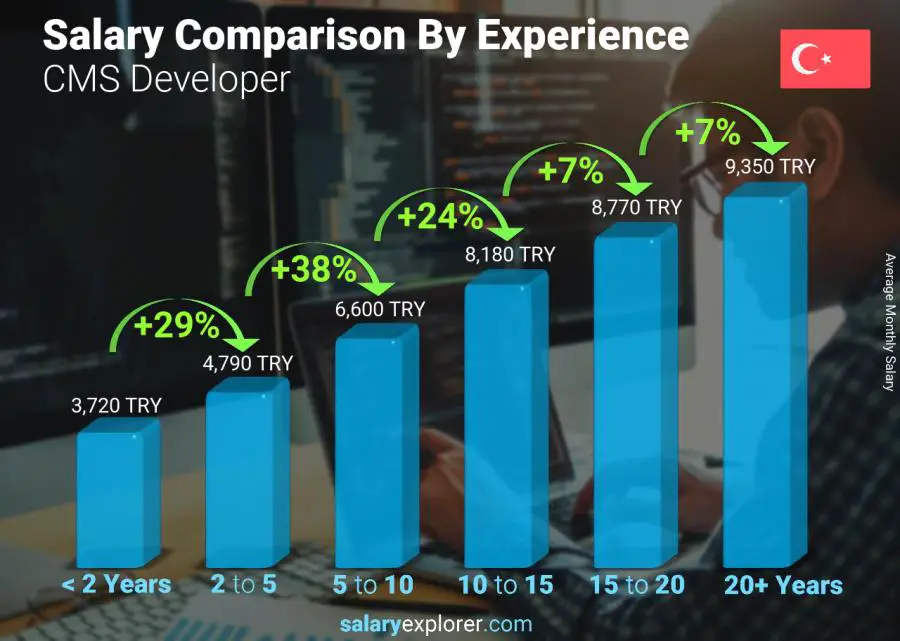
The experience level is the most important factor in determining the salary. Naturally, the more years of experience the higher the wage. We broke down salaries by experience level for people working as CMS Developer and this is what we found.
Employees with less than two years of experience earn approximately 3,720 TRY.
While someone with an experience level between two and five years is expected to earn 4,790 TRY, 29% more than someone with less than two year's experience.
Moving forward, an experience level between five and ten years lands a salary of 6,600 TRY, 38% more than someone with two to five years of experience.
Additionally, professionals whose expertise span anywhere between ten and fifteen years get a salary equivalent to 8,180 TRY, 24% more than someone with five to ten years of experience.
If the experience level is between fifteen and twenty years, then the expected wage is 8,770 TRY, 7% more than someone with ten to fifteen years of experience.
Lastly, employees with more than twenty years of professional experience get a salary of 9,350 TRY, 7% more than people with fifteen to twenty years of experience.
Typical Salary Progress for Most Careers
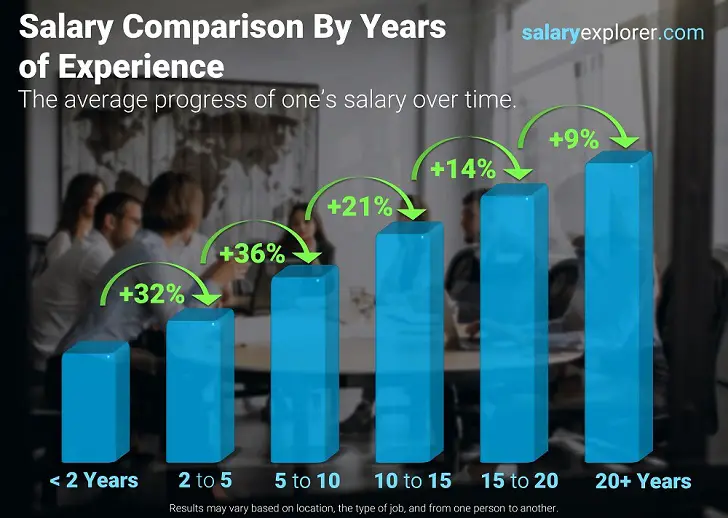
Salary Comparison By Education / CMS Developer / Turkey
How do education levels affect salaries?
Displayed below is the average salary variance between different education levels of professionals working as CMS Developer.
| Certificate or Diploma | 4,790 TRY | |
| Bachelor's Degree | +34% | 6,430 TRY |
| Master's Degree | +53% | 9,860 TRY |

We all know that higher education equals a bigger salary, but how much more money can a degree add to your income? We broke down salaries by education level for the position CMS Developer in order to make a comparison.
Level 1: Certificate or Diploma
Employees at this education level have an average salary of 4,790 TRY.
Level 2: Bachelor's Degree
At this level, the average salary becomes 6,430 TRY, 34% more than the previous level.
Level 3: Master's Degree
At this level, the average salary becomes 9,860 TRY, 53% more than the previous level.
Is a Master's degree or an MBA worth it? Should you pursue higher education?
A Master's degree program or any post-graduate program in Turkey costs anywhere from 39,300 TRY to 118,000 TRY and lasts approximately two years. That is quite an investment.
You can't really expect any salary increases during the study period, assuming you already have a job. In most cases, a salary review is conducted once education is completed and the degree has been attained.
Many people pursue higher education as a tactic to switch to a higher-paying job. The numbers seem to support the theory. The average increase in compensation while changing jobs is approximately 10% more than the customary salary increment.
If you can afford the costs of higher education, the return on investment is definitely worth it. You should be able to recover the costs in roughly a year or so.
Typical Salary Difference by Education for Most Careers
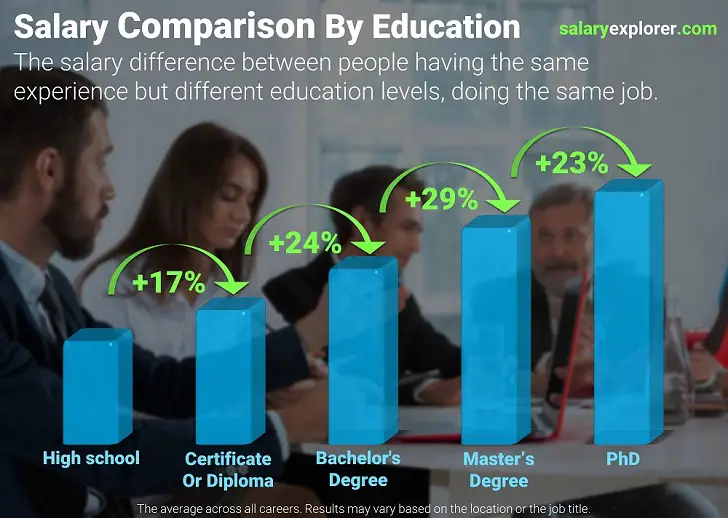
Salary and Compensation Comparison By Gender / CMS Developer / Turkey

Though gender should not have an effect on pay, in reality, it does. So who gets paid more: men or women? For the people who work as CMS Developer in Turkey, the average difference between the salary of male and female employees is 11%.
| Male | 6,670 TRY | |
| Female | -10% | 6,020 TRY |
Salary Comparison By Gender in Turkey for all Careers
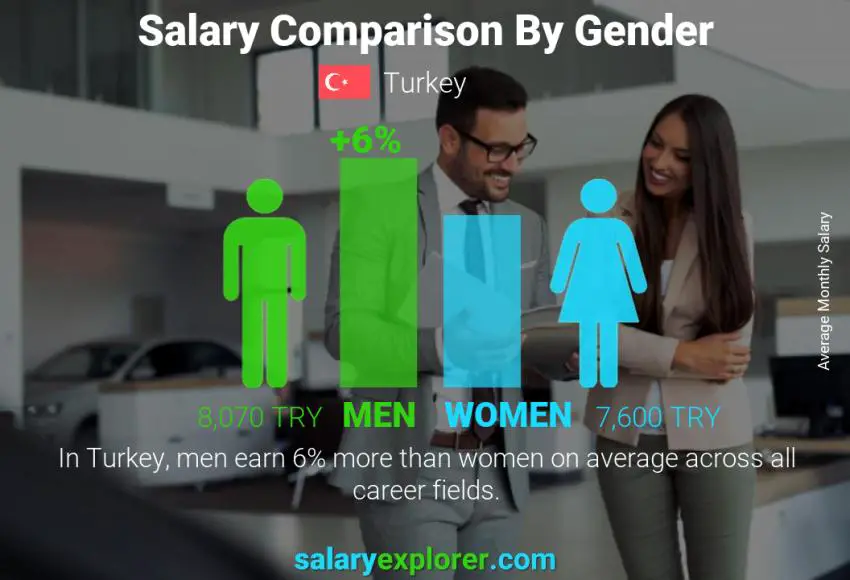
Average Annual Salary Increment Percentage / CMS Developer / Turkey
How much are annual salary increments in Turkey for individuals working as CMS Developer? How often do employees get salary raises?
Individuals working as CMS Developer in Turkey are likely to observe a salary increase of approximately 10% every 19 months. The national average annual increment for all professions combined is 8% granted to employees every 18 months.
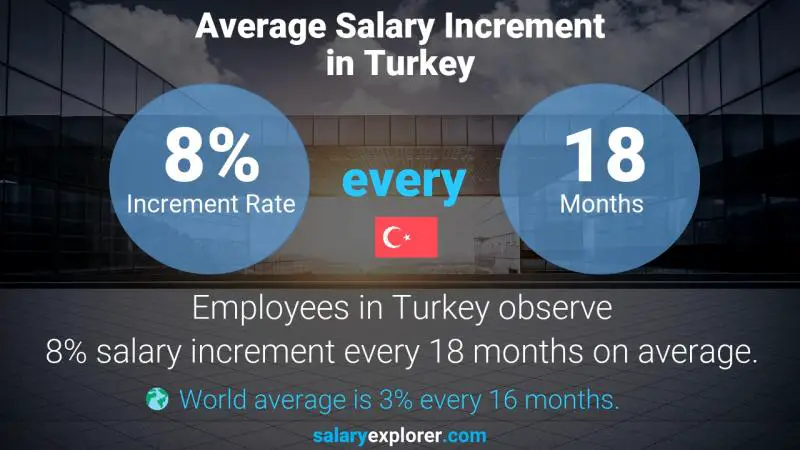
Turkey / All Professions
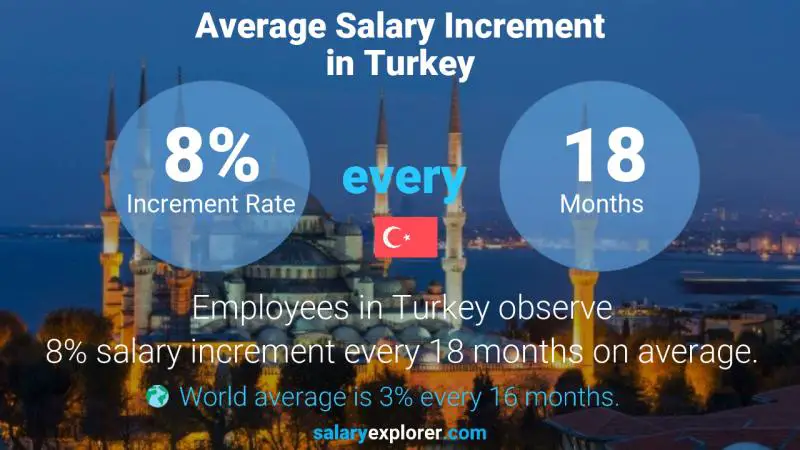
The term Annual Salary Increase usually refers to the increase in 12 calendar month period, but because it is rare that people get their salaries reviewed exactly on the one-year mark, it is more meaningful to know the frequency and the rate at the time of the increase.
How to calculate the salary increment percentage?
The annual salary Increase in a calendar year (12 months) can be easily calculated as follows: Annual Salary Increase = Increase Rate x 12 / Increase Frequency
Worldwide Salary Raises: All Countries and All Jobs
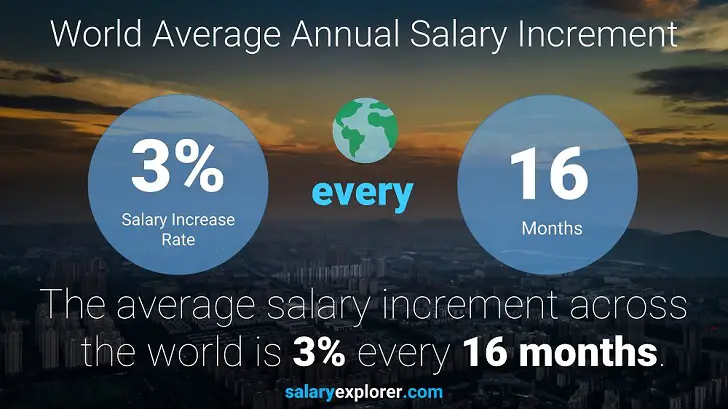
Salary Packages and Schemes
Not all compensation increases are reflected directly in the salary. Some companies offer upgraded packages to their staff instead of cash money. The figures displayed here account only for direct increments to the base salary.
Bonus and Incentive Rates / CMS Developer / Turkey
How much and how often are bonuses being awarded? Share This Chart Tweet Get Chart Linkhttp://www.salaryexplorer.com/charts/turkey/information-technology/developers-and-programmers/cms-developer/annual-salary-bonus-rate-turkey-cms-developer.jpg
Share This Chart Tweet Get Chart Linkhttp://www.salaryexplorer.com/charts/turkey/information-technology/developers-and-programmers/cms-developer/annual-salary-bonus-rate-turkey-cms-developer.jpg
45% of surveyed staff reported that they haven't received any bonuses or incentives in the previous year while 55% said that they received at least one form of monetary bonus.
Those who got bonuses reported rates ranging from 3% to 6% of their annual salary.
| Received Bonus | 55% | |
| No Bonus | 45% |
Types of Bonuses Considered
Individual Performance-Based BonusesThe most standard form of bonus, where the employee is awarded based on their exceptional performance.
Company Performance BonusesOccasionally, some companies like to celebrate excess earnings and profits with their staff collectively in the form of bonuses that are granted to everyone. The amount of the bonus will probably be different from person to person depending on their role within the organization.
Goal-Based BonusesGranted upon achieving an important goal or milestone.
Holiday / End of Year BonusesThese types of bonuses are given without a reason and usually resemble an appreciation token.
Bonuses Are Not Commissions!
People tend to confuse bonuses with commissions. A commission is a prefixed rate at which someone gets paid for items sold or deals completed while a bonus is in most cases arbitrary and unplanned.
What makes a position worthy of good bonuses and a high salary?
The main two types of jobs | |
| Revenue Generators | Supporting Cast |
Employees that are directly involved in generating revenue or profit for the organization. Their field of expertise usually matches the type of business. | Employees that support and facilitate the work of revenue generators. Their expertise is usually different from that of the core business operations. |
Example: | Example: |
Revenue generators usually get more and higher bonuses, higher salaries, and more frequent salary increments. The reason is quite simple: it is easier to quantify your value to the company in monetary terms when you participate in revenue generation.
Bonus Comparison by Seniority Level
Top management personnel and senior employees naturally exhibit higher bonus rates and frequencies than juniors. This is very predictable due to the inherent responsibilities of being higher in the hierarchy. People in top positions can easily get double or triple bonus rates than employees down the pyramid.
Average Hourly Wage / CMS Developer / Turkey
 37 TRY per hour
37 TRY per hourThe average hourly wage (pay per hour) for individuals working as CMS Developer in Turkey is 37 TRY.This is the rate they get paid for every worked hour.
About The Hourly Pay Rate
The hourly wage is the salary paid in one worked hour. Usually, jobs are classified into two categories: salaried jobs and hourly jobs. Salaried jobs pay a fixed amount regardless of the hours worked. Hourly jobs pay per worked hour. To convert salary into hourly wage the above formula is used (assuming 5 working days in a week and 8 working hours per day which is the standard for most jobs). The hourly wage calculation may differ slightly depending on the worked hours per week and the annual vacation allowance. The figures mentioned above are good approximations and are considered to be the standard. One major difference between salaried employees and hourly paid employees is overtime eligibility. Salaried employees are usually exempt from overtime as opposed to hourly paid staff.
What is the minimum hourly rate of pay?
The minimum pay rate per hour for people working as CMS Developer in Turkey is 18 TRY. This is the minimum as per the gathered data in the salary survey not the minimum hourly rate mandated by law.
Salary comparison with similar jobs
| Job Title | Average Salary |
| Information Technology |  -100% -100% | |
| ABAP Developer | 7,230 TRY |  +13% +13% |
| Android Developer | 7,960 TRY |  +24% +24% |
| Angular Developer | 6,720 TRY |  +5% +5% |
| Angular JS Programmer | 7,060 TRY |  +10% +10% |
| Application Developer | 8,170 TRY |  +27% +27% |
| AS400 Programmer | 8,390 TRY |  +31% +31% |
| Assembly Developer | 8,180 TRY |  +28% +28% |
| Avaloq Developer | 7,280 TRY |  +14% +14% |
| Back End Developer | 8,140 TRY |  +27% +27% |
| BizTalk Developer | 8,100 TRY |  +26% +26% |
| Build and Release Engineer | 6,820 TRY |  +6% +6% |
| Business Intelligence Developer | 8,170 TRY |  +27% +27% |
| Business Objects Developer | 6,970 TRY |  +9% +9% |
| C Developer | 8,940 TRY |  +39% +39% |
| C# Developer | 7,930 TRY |  +24% +24% |
| C++ Developer | 8,170 TRY |  +27% +27% |
| Chatbot Developer | 7,190 TRY |  +12% +12% |
| Clojure Developer | 9,950 TRY |  +55% +55% |
| CMS Developer | 6,410 TRY |  +0% +0% |
| Computer Programmer | 7,860 TRY |  +23% +23% |
| Curam Developer | 6,630 TRY |  +3% +3% |
| Dart Developer | 5,780 TRY |  -10% -10% |
| Delphi Developer | 8,560 TRY |  +34% +34% |
| Developer / Programmer | 7,750 TRY |  +21% +21% |
| Developer Evangelist | 8,000 TRY |  +25% +25% |
| DevOps Engineer | 8,100 TRY |  +26% +26% |
| Django Specialist | 7,480 TRY |  +17% +17% |
| Driver Developer | 8,490 TRY |  +32% +32% |
| Elixir Developer | 9,930 TRY |  +55% +55% |
| Embedded Software Developer | 8,170 TRY |  +27% +27% |
| Erlang Developer | 9,710 TRY |  +52% +52% |
| Flash Developer | 6,790 TRY |  +6% +6% |
| Front End Developer | 6,860 TRY |  +7% +7% |
| Front End Web Developer | 6,350 TRY |  -1% -1% |
| Full Stack Developer | 7,620 TRY |  +19% +19% |
| Game Developer | 7,020 TRY |  +10% +10% |
| GIS Developer | 7,420 TRY |  +16% +16% |
| Go Developer | 9,850 TRY |  +54% +54% |
| Graphical User Interface ( GUI ) Programmer | 7,040 TRY |  +10% +10% |
| Graphics Programmer | 7,000 TRY |  +9% +9% |
| Groovy Developer | 8,820 TRY |  +38% +38% |
| Haskell Developer | 8,090 TRY |  +26% +26% |
| Imaging Programmer | 6,500 TRY |  +1% +1% |
| Information Systems Developer | 7,520 TRY |  +17% +17% |
| IOS Developer | 8,090 TRY |  +26% +26% |
| Java Developer | 8,210 TRY |  +28% +28% |
| Javascript Developer | 7,670 TRY |  +20% +20% |
| jQuery Specialist | 7,330 TRY |  +14% +14% |
| Kotlin Developer | 8,610 TRY |  +34% +34% |
| Laravel Specialist | 7,610 TRY |  +19% +19% |
| Lead Developer | 8,640 TRY |  +35% +35% |
| Lisp Developer | 9,540 TRY |  +49% +49% |
| Lua Developer | 8,740 TRY |  +36% +36% |
| MATLAB Developer | 8,570 TRY |  +34% +34% |
| Mobile Developer | 7,890 TRY |  +23% +23% |
| Multimedia Developer | 6,790 TRY |  +6% +6% |
| NextJs Specialist | 7,150 TRY |  +12% +12% |
| Nodejs Developer | 7,910 TRY |  +23% +23% |
| Objective-C Developer | 8,940 TRY |  +39% +39% |
| Oracle Developer | 7,830 TRY |  +22% +22% |
| Perl Developer | 6,730 TRY |  +5% +5% |
| PHP Developer | 7,180 TRY |  +12% +12% |
| PowerShell Developer | 7,300 TRY |  +14% +14% |
| Python Developer | 8,020 TRY |  +25% +25% |
| R Language Developer | 9,160 TRY |  +43% +43% |
| React Specialist | 8,060 TRY |  +26% +26% |
| Remedy Developer | 6,110 TRY |  -5% -5% |
| Robotic Process Automation Developer | 6,490 TRY |  +1% +1% |
| Ruby Developer | 7,190 TRY |  +12% +12% |
| Rust Developer | 9,120 TRY |  +42% +42% |
| Salesforce Developer | 6,340 TRY |  -1% -1% |
| SAS Programmer | 7,020 TRY |  +10% +10% |
| Scala Developer | 9,790 TRY |  +53% +53% |
| Sharepoint Developer | 8,390 TRY |  +31% +31% |
| Software Developer | 7,470 TRY |  +17% +17% |
| Software Development Manager | 10,300 TRY |  +61% +61% |
| Software QA Engineer | 7,340 TRY |  +15% +15% |
| Software Test Engineer | 6,400 TRY |  -0% -0% |
| Swift Developer | 9,010 TRY |  +41% +41% |
| Teradata Developer | 6,460 TRY |  +1% +1% |
| TIBCO Developer | 6,900 TRY |  +8% +8% |
| TypeScript Developer | 8,770 TRY |  +37% +37% |
| UI Engineer | 7,110 TRY |  +11% +11% |
| User Experience Designer | 7,090 TRY |  +11% +11% |
| VB Developer | 5,770 TRY |  -10% -10% |
| VB.NET Developer | 7,780 TRY |  +21% +21% |
| Visual Basic Developer | 6,170 TRY |  -4% -4% |
| VueJs Specialist | 7,370 TRY |  +15% +15% |
| WordPress Specialist | 7,430 TRY |  +16% +16% |
| Zig Developer | 10,400 TRY |  +62% +62% |
Government vs Private Sector Salary Comparison
Where can you get paid more, working in a private company or the government? The difference between the public or government sector salaries and the private sector salaries in Turkey is 5% on average across all career fields.
| Private Sector | 7,660 TRY | |
| Public Sector | +5% | 8,040 TRY |
Salary Statistics and Calculation Guide
What is considered to be a good and competitive salary for the job title CMS Developer in Turkey?
A good and competitive compensation would range anywhere between 5,980 TRY and 6,840 TRY. This is a very rough estimate. Experience and education play a very huge part in the final earnings.
Gross Salary (before tax) and Net Salary (after tax)
All salary and compensation figures displayed here are gross salary figures, that is the salary before tax deductions. Because taxes may differ across sectors and locations, it is difficult to accurately calculate the net salary after tax for every career.
Base / Basic Salary
The base salary for a careers like CMS Developer in Turkey ranges from 3,140 TRY to 4,890 TRY. The base salary depends on many factors including experience and education. It is not easy to provide a figure with very little information, so take this range with a grain of salt.
What is the difference between the median and the average salary?
Both are indicators. If your salary is higher than both the average and the median then you are doing very well. If your salary is lower than both, then many people earn more than you and there is plenty of room for improvement. If your wage is between the average and the median, then things can be a bit complicated. We wrote a guide to explain all about the different scenarios. How to compare your salary




